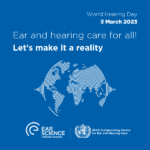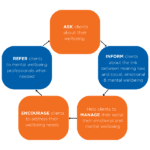
The Impacts of Hearing Loss
In past articles, we have established that hearing loss often has an overtly negative impact on the mental health and well-being of the affected individual. The psychological effects of hearing loss can be significant and far-reaching. It then begs the question:
Do hearing aids and other interventions that improve hearing loss also improve mental health?
When an individual can reconnect with the world around them through the use of hearing aids or other interventions, it can have a profoundly positive impact on their mental health. Being able to hear and engage in conversations with loved ones, enjoy music and the sounds of nature, and participate in social activities can help to combat feelings of isolation and loneliness that result from the impact of hearing loss. This may improve overall mood and reduce the negative symptoms of anxiety and depression.
It’s important to note that not everyone experiences hearing loss in the same way, and individuals may miss different sounds and experiences based on their own unique preferences. For this reason, it’s important to approach the effects of hearing loss with empathy and understanding.
Treating hearing loss can allow an individual to experience a range of sounds they may have been missing, like music and sounds from nature. Studies show that experiencing these sounds can have a positive impact on mental health. These sounds are often associated with positive emotions and relaxation.
Positive Effects of Music on Mental Health
A published review of studies into music, mental health, and immunity (Rebecchini, 2021) explored the effects of music on mental health and immune function. It also highlights how listening to music can alter stress and mood. The study concluded that there are positive effects of music. It can stimulate the production of immune cells and reduce the levels of stress hormones being released in the body, leading to improved immune function and mental well-being.
In addition, Dingle (2021) reviewed existing research on the impact of music on health and well-being, with a focus on the psychosocial mechanisms involved. The study also demonstrated that there are positive effects of listening to music. It can impact a wide range of health outcomes, including mental health, physical health, and social functioning. It identified several key psychosocial mechanisms by which music can have these effects, including emotional regulation, social bonding, and the promotion of positive cognitive states.
In conjunction, these studies suggest that music can have a powerful impact on mental and overall health. By reducing stress, promoting positive emotions, and enhancing social connections, music can help to improve mood and even immune response. Therefore, incorporating music into daily life may be a valuable tool for improving mental health and overall well-being.
The Benefits of Hearing Sounds in Nature
A study published in 2021 (Buxton) examined the mental health benefits of bird sounds. The researchers used smartphone-based surveys to investigate the relationship between birdlife and mental health. Participants were prompted to complete short surveys throughout the day, reporting on their moods and experiences with bird sounds. The study found that exposure to birdlife and the accompanying sounds was associated with improved mood and lower levels of anxiety and depression.
In their paper, “A synthesis of health benefits of natural sounds and their distribution in national parks,” Buxton and colleagues also reviewed existing research on the impact of natural sounds on health. The review found that exposure to sounds in nature can reduce stress, improve mood, and promote relaxation.
The researchers concluded that nature could be a valuable resource for improving mental and overall physical health.
Hammoud and colleagues (2022) asked 1300 people to use a smartphone phone to record their encounters with birds and their mental well-being. They showed that daily encounters with birds were associated with better mental health.
Together, these studies suggest that exposure to nature and natural sounds can have a positive impact on mental health and well-being. Birdlife, in particular, is a valuable outlet for positive experiences and mood regulation.
Hearing is one of our most important senses, allowing us to engage with the world around us and connect with others. When hearing loss occurs, it can have a significant impact on mental health and overall quality of life.
The ability to hear sounds like music and nature is also closely linked to improved mental health symptoms. However, individuals with untreated hearing loss may miss out on these benefits. Thus, treating hearing loss can have a significant impact on mental health by helping individuals reconnect with the world around them and hear sounds that promote health and happiness. Hearing aids and other interventions that improve hearing loss can thus be an important tool for improving mental health outcomes and overall quality of life.
Researchers at Ear Science are working on hearing and mental well-being.
Dr Bec Bennett and colleagues have shown that poor hearing has a negative effect on psychological health and mental well-being. People often feel left out and lonely. Dr Dona Jayakody and colleagues have shown that poorer hearing reduces cognition (thinking skills). She is currently conducting a clinical trial of hearing aids and their effect on cognition and on psychological health.
Hearing loss impacts on our mental wellbeing
Hearing loss not only affects our ability to hear, but also to connect with the world around us. The consequences of a hearing loss manifest themselves in a broad spectrum of an individual’s life. These may occur at home, in the workplace and in the community.
The social and emotional impacts of hearing loss are real, and help is available.
References:
Bennett RJ, Kelsall-Foreman I, Donaldson S, Meyer C, Panchana N, Saulsman L, Eikelboom RH, Bucks RS. Addressing emotional and psychological problems associated with hearing loss: perspective of consumer and community representatives. American Journal of Audiology. 30(4): 1130-1138; 2021. 10.1044/2021_AJA-21-00093
Buxton RT et al. A synthesis of health benefits of natural sounds and their distribution in national parks. The Proceedings of the National Academy of Sciences (PNAS). 118(14):e2013097118; 2021. https://www.pnas.org/doi/10.1073/pnas.2013097118
Dingle GA et al. How do music activities affect health and well-being? A scoping review of studies examining psychosocial mechanisms. Frontiers in Psychology. 12:713818; 2021. https://www.frontiersin.org/articles/10.3389/fpsyg.2021.713818/full
Hammoud R et al. Smartphone-based ecological momentary assessment reveals mental health benefits of birdlife. Scientific Reports. 12:17589; 2022. https://www.nature.com/articles/s41598-022-20207-6
Jayakody DMP, Wishart J, Stegeman I, Eikelboom RH, Moyle T, Yiannos JM, Goodman-Simpson J, Almeida OP. Is there an association between untreated hearing loss and psychosocial outcomes? Frontiers in Aging Neuroscience. 14:868673; 2022. 10.3389/fnagi.2022.868673
Rebecchini, L. Music, mental health, and immunity. Brain Behaviour Immunity in Health. 18:100374; 2021. https://www.ncbi.nlm.nih.gov/pmc/articles/PMC8566759/






